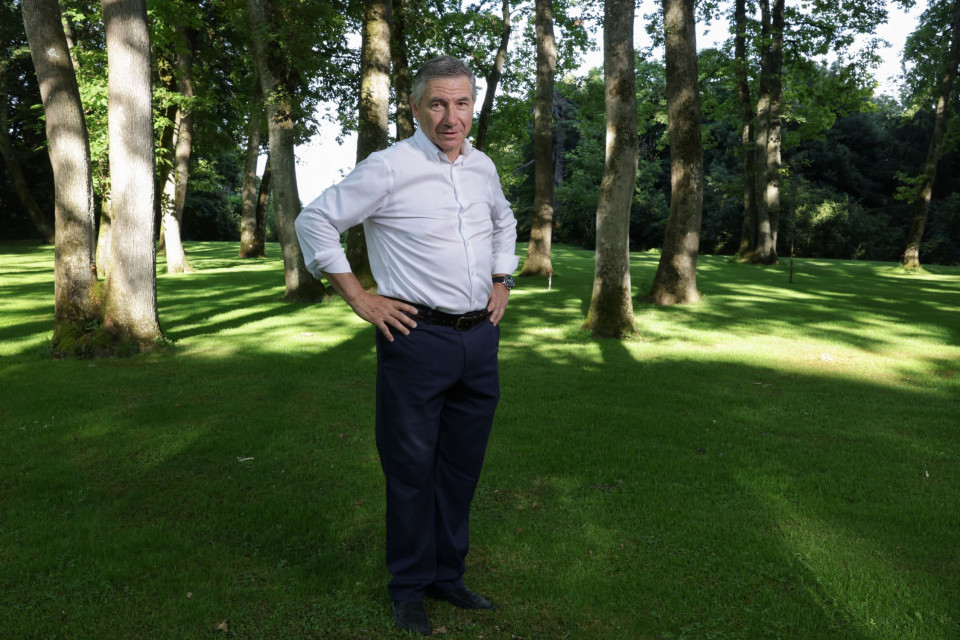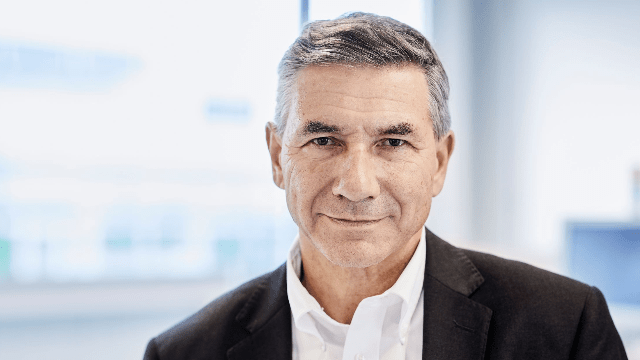François Gabella, who graduated from EPFL with a Master’s degree in 1982, has gained vast experience in his 40-year career – including at the helm of various companies. Today Gabella is a key figure in the Swiss business landscape, as he sits on the boards of several high-tech firms and serves as vice president of Swissmem. He spoke with us about the threats and opportunities facing Switzerland’s economy and the role EPFL can play.
By Nina Eggert and Arnaud Aubelle
You’ve had an extensive career working for Swiss and foreign companies. Can you walk us through the milestones?
I come from a family of engineers. My father was a civil engineer – he also graduated from EPFL – and my brothers and I all became mechanical engineers. I must admit, though, that my grades at EPFL weren’t great. My GPA each year was close to the minimum, mainly because I was involved in many extracurricular activities. I started my career in 1983, working for Schlumberger in the US. The company provides oilfield equipment and services, and I was responsible for implementing automated production systems. That was my only real experience as an engineer because I sold a patent shortly afterwards and used the proceeds to do an MBA at IMD, where I graduated in 1986. That paved the way for me to move into management and strategy.
In 1987, I took a job as the head of the transport division at an industrial company called Ateliers de Construction Mécaniques de Vevey. There we developed the world’s first low-floor trams – they’re still circulating today in cities like Bern and Geneva. I also worked on the Metro line 1 in Lausanne. I then joined ABB in 1993 as the head of the ABB Sécheron branch in Geneva and was later given responsibility for the company’s 34 current-transformer plants around the world. But the job required a lot of travel and I wanted to spend more time with my family, so I left big business and sought out opportunities at smaller, more agile firms.
I spent two years working in private equity and company restructurings before becoming the CEO of Tesa, a company that makes precision measuring instruments ranging from 1D to 3D. In 2009, I was named the CEO of LEM, a leading global provider of current-measurement systems.
" I really believe in the human dimension. I’ve always been surrounded by people who were more skilled than I am in their area of expertise. It’s very gratifying to be able to inspire them and bring them together around a common goal.”
Why did you decide so early in your engineering career to move into management and strategy?
I’ve always been attracted to the strategic, holistic view of things. Of course, having an innovative product that meets a market need is essential, but you’ve also got to be able to sell it and optimize your business processes.
And I really believe in the human dimension. I’ve always been surrounded by people who were more skilled than I am in their area of expertise. It’s very gratifying to be able to inspire them and bring them together around a common goal. If I had to choose another career, I’d probably pick one in human resources. A big challenge facing businesses today is how to reconcile their need for meeting productivity targets with the aspirations of generations X, Y and Z – individuals who, broadly speaking, are looking for jobs that have meaning and offer greater flexibility. This challenge will only become more complicated in the future. We’ve still got a long way to go, regardless of what you may read in companies’ glossy brochures.
Today you’re no longer involved in operations but instead sit on the boards of several companies. What do you enjoy about this role?
I moved out of operations in 2018 and have since joined the boards of several companies, mostly in the manufacturing sector, including LEM, Sonceboz and Alpiq. I believe a healthy business is one that’s run by competent managers who oversee day-to-day operations. The board of directors’ job isn’t to get caught up in the company’s short-term results, but rather to take a long-term view and identify threats and opportunities. It’s a complicated task that may seem contradictory: how can a group of people who don’t work in an organization on a daily basis bring this kind of added value? The answer is that you’ve got to have a strategic vision and be able to step back and see the bigger picture. That’s what I love about sitting on company boards.
You’re also involved in a number of umbrella industry organizations.
Yes, I’m the vice president of Swissmem, which is an association of Swiss high-tech companies, and the vice president of Switzerland Global Enterprise, which supports small and medium-sized exporters. I’m also a member of the board of economiesuisse.
These organizations are designed to help businesses grow and expand. But they also aim to ensure citizens and policymakers do not take Switzerland’s long-term prosperity for granted. We need to keep improving business conditions in the country, such as by promoting training and by facilitating access to export markets, which is crucial. I have the feeling our country is sitting on its laurels and losing its get-up-and-go.
What makes you say that, when the Swiss economy is doing so well?
I’ve seen that people here tend to shy away from ambitious initiatives, and there’s been a growing trend towards state interventionism, which are worrying signs. If you attach a weight belt to a champion swimmer, he’ll still win some races, but – no matter how talented he may be – he’ll swim more slowly as the weight increases. The same holds true for the Swiss economy. Economic strength is a relative concept. It’s true that Switzerland is faring exceptionally well, with very low unemployment and a trade surplus, for example. But we’re also facing many headwinds: a strong Swiss franc, heavy regulations, cooling relations with the EU and more. Taken individually, each of these factors can be managed, but all together they become suffocating. We need to keep our swimmer afloat!
How can we spur innovation in Switzerland, and what role can a university like EPFL play?
Innovation by definition can’t be planned. If you want to sow the seeds, you’ve got to create the right conditions. I think that’s exactly what schools like EPFL can do: provide the ideal conditions for engineers to come up with out-of-the-box ideas and test them out. EPFL offers this kind of freedom along with an amazing pool of knowledge to draw from. I’d say EPFL has the additional role of supporting businesses by training highly skilled engineers and providing what I might call a “technology supermarket” where companies can come and find what they need. I think EPFL has been effective at improving its communications in this area, but it still needs to build stronger bridges with industry. Innovation must be useful and accessible to businesses, yet too many of them still don’t know all that’s available in the “supermarket.”

François Gabella at the EPFL Alumni 2024 Garden Party at Domaine les Bois Chamblard
One of the headwinds you mentioned relates to funding, and in particular the cuts in the budget that the Swiss federal government provides to ETH schools. How will that affect Swiss businesses?
I, like EPFL’s management, am worried about the budget cuts. And it’s only natural since there’s a direct correlation between Switzerland’s prosperity and the funds allocated to ETH schools.
As a businessman, I’m inclined to first look for opportunities to optimize existing processes before asking for more funds. In that regard, I think ETH schools have been exemplary in their efficiency. For instance, EPFL’s student body has tripled since 2000 but its budget has barely doubled. The School has also introduced degree programs in fields like life science, the environment, cybersecurity and AI, and it has opened campuses in Geneva, Neuchâtel, Fribourg and Sion.
Going forward, I believe online classes and AI will be key to further improving the efficiency of higher education. That said, the human aspect will always be fundamental. Private-sector funding could be an option to explore before considering more drastic measures like putting a cap on student numbers or raising tuition.
What’s your view on the discussions on the bilateral agreements between Switzerland and the EU?
A lot of damage was caused when the talks were halted two years ago. I don’t want to go into the details, but Switzerland’s attitude irritated more than one country. After a two-year break, we now have a shot at restoring ties with the EU, which is still our main trading and research partner. We mustn’t miss the boat. No agreement is perfect, but the one taking shape is encouraging and, above all, crucial for Switzerland. We can’t let hardliners and opportunists sabotage an agreement they haven’t even read yet.
“We now have a shot at restoring ties with the EU, which is still our main trading and research partner. We mustn’t miss the boat.”
What ties do you still have with EPFL?
I actively support funding for ETH schools through my involvement in industry organizations. And this interview has made me realize that over half of my friends are ETH engineers! I also keep track of developments at EPFL and enjoy EPFL Alumni’s Garden Party. I’m delighted to see EPFL’s reputation grow across Switzerland and abroad.
BIO
- 1982 Graduates from EPFL with a Master’s in mechanical engineering
- 1986 Obtains an MBA from IMD in Lausanne
- 1987 Named head of the transport division at Ateliers de Construction Mécaniques de Vevey
- 1993 Appointed Business Area Manager at ABB
- 2005 Appointed CEO of Tesa
- 2009 Appointed CEO of LEM
- Since 2018: Board member of several companies (including LEM, Sonceboz, Sensirion, Optotune and Alpiq) and active in the umbrella organizations Swissmem, Switzerland Global Enterprise and economiesuisse

Comments0
Please log in to see or add a comment
Suggested Articles



